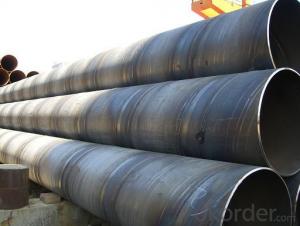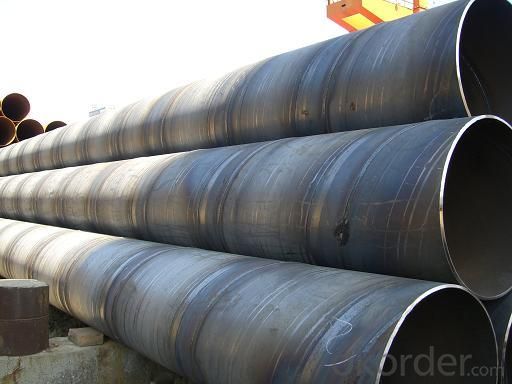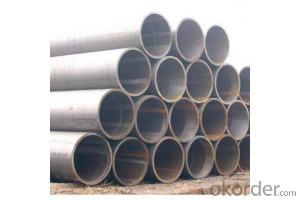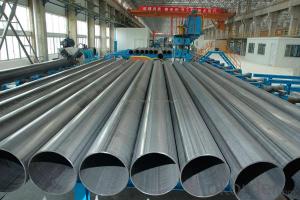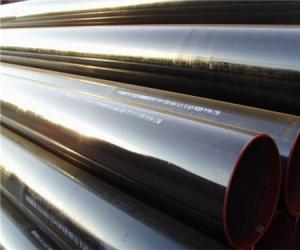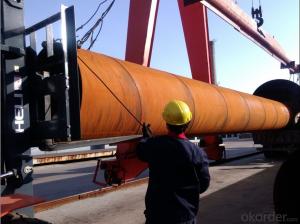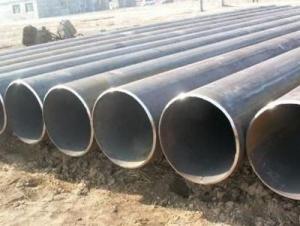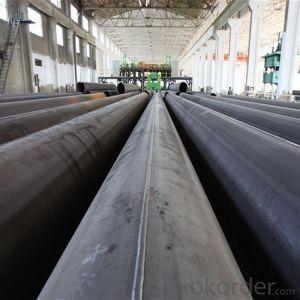LSAW SSAW CARBON STEEL PIPE API 5L PSL1 24''
- Loading Port:
- Tianjin
- Payment Terms:
- TT OR LC
- Min Order Qty:
- 1 m.t.
- Supply Capability:
- 3000 m.t./month
OKorder Service Pledge
OKorder Financial Service
You Might Also Like
Packaging & Delivery
Packaging Detail: | Normal exporting packing,in container or bulk vessel or as per clients' request |
Delivery Detail: | 2 months after confimed contract |
Specifications
Large Diameter API 5L X70 PSL2 LSAW Steel Pipe
Grade: X42, X46, X50, X52, X60, B, C
OD: 1.5"-28"
WT: SCH10-SCH160
Large Diameter API 5L X70 PSL2 LSAW Steel Pipe
Specifications:
u Standard: API 5L
u Grade: B, C, X42, X46, X50, X52, X56, X60, X65, X70, X80
u OD: 1.5"-28"
u WT: SCH10-SCH160
u Length: 5-12m
u Ends Finish: plain end, bevel end, grooved end
u Surface Treatment: bare, black varnished, oiled finish, red color, anti-corrosion, 3PE, FBE or epoxy coating
u Technique: hot rolled or cold drawn
u Application: api 5l steel pipe for conveying oil, water, gas
u Invoicing: based on theoretical weight or actual weight
u Payment Terms: L/C at sight, T/T or Western Union
u Trade Terms: FOB, CFR, CIF
u Certification: ABS manufacturing assessment, ABS design assessment, API 5CT, API 5L, DNV manufacturer certificate, ISO9001 quality management system certificate, ISO14001 environment management system certificate, GB/T28001 occupational health and safety management system certificate, A1 class manufacturing license of special equipment certificate, CCS, GL, LR, SGS, TüV, PDE
- Q: How are steel pipes used in the manufacturing sector?
- Steel pipes are used in the manufacturing sector for various purposes such as transporting fluids and gases, supplying water, and carrying out structural applications. They are commonly used in industries like oil and gas, construction, automotive, and aerospace for their durability, strength, and resistance to corrosion. Additionally, steel pipes are crucial in the manufacturing of machinery, equipment, and infrastructure, making them essential components in many manufacturing processes.
- Q: Can steel pipes be used for underground applications?
- Yes, steel pipes can be used for underground applications. They are commonly used for underground piping systems in various industries such as water, oil, and gas. The durability and strength of steel make it suitable for withstanding underground conditions, providing reliable and long-lasting performance.
- Q: What is the minimum wall thickness for steel pipes?
- The minimum wall thickness for steel pipes depends on several factors, including the intended use of the pipe and the specific industry standards and regulations. In general, the minimum wall thickness is determined by considering factors such as the pipe's diameter, the material strength, and the pressure or load it will be subjected to during operation. For example, in the oil and gas industry, the minimum wall thickness for steel pipes is usually specified by industry standards such as API 5L or ASME B31.3. These standards take into account factors such as the pipe's diameter, the material's yield strength, and the maximum pressure it will be exposed to. In other applications, such as structural or mechanical engineering, the minimum wall thickness for steel pipes is determined based on factors such as the pipe's intended load-bearing capacity, the desired safety factor, and any applicable building codes or regulations. It is important to consult the appropriate industry standards, codes, or regulations to determine the specific minimum wall thickness requirements for steel pipes in a given application.
- Q: Can steel pipes be used for structural applications?
- Indeed, structural applications can make use of steel pipes. With their high strength, durability, and ability to withstand various environmental conditions, steel pipes prove to be suitable for such purposes. The construction industry often relies on them to fabricate buildings, bridges, and other structures. Notably, steel pipes possess exceptional load-bearing capacity and can endure heavy loads, making them perfect for supporting structures and transferring loads. Moreover, the ease with which steel pipes can be fabricated, welded, and connected facilitates efficient construction. As a result, steel pipes emerge as a dependable and cost-effective choice for structural applications.
- Q: What is the role of steel pipes in the transportation of liquefied natural gas (LNG)?
- Steel pipes play a crucial role in the transportation of liquefied natural gas (LNG) as they are used to create the necessary infrastructure for the safe and efficient transfer of LNG. These pipes are designed to withstand the extreme cold temperatures and high pressures associated with LNG, ensuring the integrity and reliability of the transportation system. They are used to construct LNG terminals, storage tanks, and pipelines, providing a secure conduit for the LNG to be transported from production sites to distribution centers or export facilities. Steel pipes are preferred due to their strength, durability, and ability to resist corrosion, making them essential for the smooth and reliable transport of LNG across long distances.
- Q: How are steel pipes used in the manufacturing of furniture and appliances?
- Due to their strength, durability, and versatility, steel pipes find widespread use in the production of furniture and appliances. In furniture manufacturing, they are commonly employed to construct the frames and structures of various pieces, including chairs, tables, and beds. Serving as the primary support system, these pipes ensure a sturdy and dependable foundation for the furniture. In appliances, steel pipes serve multiple purposes. They are frequently utilized to create the internal framework and bear the weight of kitchen appliances such as stoves, ovens, and refrigerators. Additionally, steel pipes are commonly found in washing machines, dryers, and dishwashers, facilitating the transportation of water and other fluids throughout the appliance. Moreover, steel pipes are essential in the manufacture of outdoor furniture and equipment that require weather resistance and durability. To safeguard against rust and corrosion, these pipes are often coated with protective materials, thus ensuring the longevity of the furniture and appliances. In conclusion, steel pipes play a vital role in the production of furniture and appliances, providing the necessary strength and support. Their versatility allows for various applications, making them an indispensable component in the manufacturing process of these goods.
- Q: How are steel pipes used in the manufacturing of agricultural machinery?
- Steel pipes are commonly used in the manufacturing of agricultural machinery for various purposes such as structural support, fluid transportation, and protection. They are utilized to create the framework and chassis of the machinery, providing strength and durability. Steel pipes are also used to transport fluids such as fuel, water, and chemicals throughout the machinery. Additionally, steel pipes can be used to protect vulnerable components from external elements, ensuring the longevity and reliability of the agricultural machinery.
- Q: What are the main types of steel pipe ah? How to judge which kind of steel pipe performance is better?
- Welded steel pipe for different welding process and divided into the furnace pipe welding (ERW) pipe and automatic arc welding, because of the different forms of welding seam welded pipe and spiral welded pipe is divided into two kinds, end its shape is divided into circular welded and shaped (square, flat) pipe.The welded pipe is rolled into the steel tubular to sew or spiral seam welded in the manufacturing method, and is divided into low pressure fluid delivery with welded steel pipe, spiral welded steel pipe, welded steel pipe, welded pipe roll etc.. Seamless steel pipe can be used in various industries, such as liquid, pneumatic, pipeline and gas pipeline. Welding pipes can be used in water pipelines, gas pipelines, heating pipes, electrical appliances, pipelines and so on.Press materialSteel pipe according to the pipe material (ie steel) can be divided into: carbon tube and alloy tube, stainless steel tube.Carbon tube can be divided into ordinary carbon steel tube and high quality carbon structure tube.The alloy tube can be divided into: low alloy pipe, alloy pipe structure, high alloy tube, high strength tube. Bearing tube, heat resistant acid resistant stainless pipe, precision alloy (such as cutting alloy) pipe, high temperature alloy tube, etc..
- Q: What is the load-bearing capacity of steel pipes?
- The load-bearing capacity of steel pipes depends on various factors such as the diameter, wall thickness, and grade of the steel used. Generally, steel pipes have high load-bearing capacity due to their inherent strength and durability. The load-bearing capacity can be determined through engineering calculations and testing methods. These calculations consider factors like the applied load, pipe dimensions, and the material properties of the steel. It is important to consult engineering standards and guidelines, as well as a structural engineer, to accurately determine the load-bearing capacity of specific steel pipes for a given application.
- Q: How are steel pipes protected during transportation?
- Steel pipes are typically protected during transportation through a variety of means such as wrapping them with protective coatings, using plastic or metal caps to cover the ends, and securing them with straps or bands to prevent any movement or damage. Additionally, they may be placed in crates or on pallets and secured with stretch film or shrink wrap for added protection.
Send your message to us
LSAW SSAW CARBON STEEL PIPE API 5L PSL1 24''
- Loading Port:
- Tianjin
- Payment Terms:
- TT OR LC
- Min Order Qty:
- 1 m.t.
- Supply Capability:
- 3000 m.t./month
OKorder Service Pledge
OKorder Financial Service
Similar products
Hot products
Hot Searches
Related keywords
